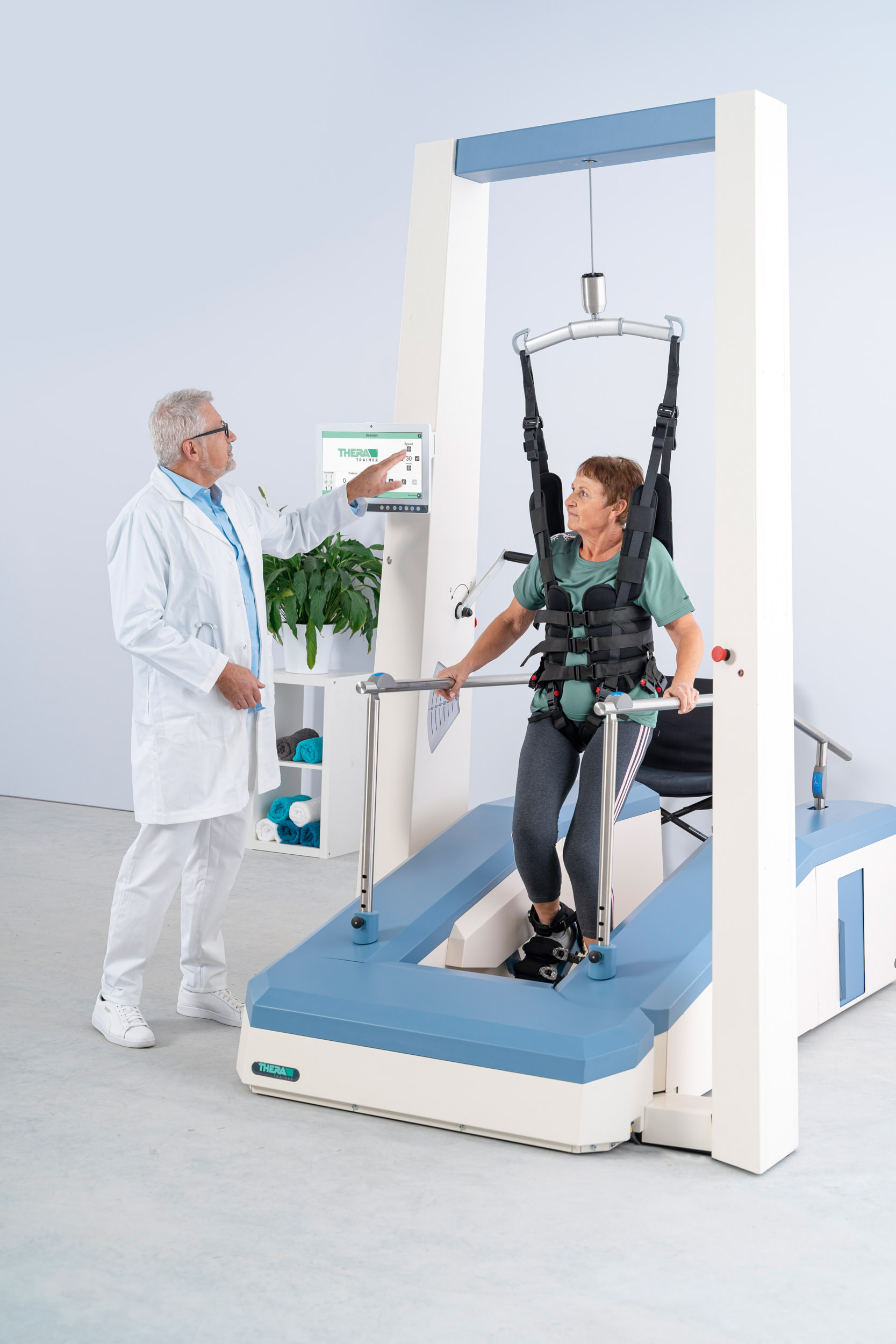
THERAPY-Magazin
Updates on robotics-based vs. conventional gait training
A new multi-centre study shows robot-assisted gait training improves walking speed and endurance in subacute stroke patients more than conventional therapy. End-effector robots outperform exoskeletons.

Jakob Tiebel
Health Business Consultant
A multi-centre controlled comparative clinical trial to investigate the effectiveness of interventions.
Although stroke survivors may benefit from robotic gait rehabilitation, inpatient robotic gait training needs further investigation. In this work, the researchers investigated the effectiveness of this approach (using an exoskeleton or an end-effector robot) compared to conventional gait training in subacute stroke survivors.
In a multi-centre, controlled clinical trial, 89 patients in the subacute stage after a stroke completed twenty sessions of robot-assisted (robot group) or conventional gait training (control group) in addition to standard daily therapy. Robotic training was performed with an exoskeleton (RobotEXO group) or an end effector (RobotEND group). Clinical outcomes were assessed before and after treatment. Walking speed during the 10-metre walk test (10 MWT) was the primary outcome in this study and secondary outcomes were the 6-minute walk test (6 MWT), the timed up and go test (TUG) and the modified Barthel index (mBI).
The characteristics studied in the robot and control groups did not differ at the start of the study. At the end of the study period, a significant advantage in the 10 MWT was observed in the robot group. A benefit was also observed in the following parameters: 6 MWT, TUG and mBI. In addition, the patients in the robot group outperformed those in the control group in walking speed, endurance, balance and ADL. Patients in the RobotEND group improved their walking speed more than those in the RobotEXO group.
The researchers conclude that inpatient robot-assisted training improves walking ability in subacute stroke survivors more than conventional training. These results suggest that people with subacute stroke may benefit from robotic training to improve walking speed and endurance. The results also suggest that end-effector robots are superior to exoskeleton robots in improving gait speed.
In a multi-centre, controlled clinical trial, 89 patients in the subacute stage after a stroke completed twenty sessions of robot-assisted (robot group) or conventional gait training (control group) in addition to standard daily therapy. Robotic training was performed with an exoskeleton (RobotEXO group) or an end effector (RobotEND group). Clinical outcomes were assessed before and after treatment. Walking speed during the 10-metre walk test (10 MWT) was the primary outcome in this study and secondary outcomes were the 6-minute walk test (6 MWT), the timed up and go test (TUG) and the modified Barthel index (mBI).
The characteristics studied in the robot and control groups did not differ at the start of the study. At the end of the study period, a significant advantage in the 10 MWT was observed in the robot group. A benefit was also observed in the following parameters: 6 MWT, TUG and mBI. In addition, the patients in the robot group outperformed those in the control group in walking speed, endurance, balance and ADL. Patients in the RobotEND group improved their walking speed more than those in the RobotEXO group.
The researchers conclude that inpatient robot-assisted training improves walking ability in subacute stroke survivors more than conventional training. These results suggest that people with subacute stroke may benefit from robotic training to improve walking speed and endurance. The results also suggest that end-effector robots are superior to exoskeleton robots in improving gait speed.
The results also suggest that end-effector robots are superior to exoskeleton robots in improving gait speed.
A well-structured new study from January 2023 supports previous findings from reviews. The suitably high number of cases underlines the quality and significance. In particular, the study highlights that end-effector robots seem to be more promising than exoskeletons in improving walking speed. Although it still cannot be ruled out that the results are distorted by different stages of the disease and degrees of functional impairment, it should be noted that people with subacute stroke who are unable to move around independently benefit considerably from inpatient robot-assisted gait training. Further large, controlled studies are needed to compare outcomes between the two device types in more homogeneous populations and to determine the optimal protocol design for maximum efficacy. The conditions that influence effectiveness still need to be better understood.
Ambulante Rehabilitation
Fachkreise
Gait
lyra
Produkte
Science
Stationäre Rehabilitation
THERAPY 2023-II
THERAPY Magazine

Jakob Tiebel
Health Business Consultant
Jakob Tiebel is OT and studied applied psychology with a focus on health economics. He has clinical expertise from his previous therapeutic work in neurorehabilitation. He conducts research and publishes on the theory-practice transfer in neurorehabilitation and is the owner of an agency for digital health marketing.
References:
- Pournajaf S, Calabrò RS, Naro A, Goffredo M, Aprile I, Tamburella F, Filoni S, Waldner A, Mazzoleni S, Focacci A, Ferraro F, Bonaiuti D, Franceschini M, TreadStroke Group. Robotic versus Conventional Overground Gait Training in Subacute Stroke Survivors: A Multicenter Controlled Clinical Trial. J Clin Med. 2023 Jan 5;12(2):439. doi: 10.3390/jcm12020439. PMID: 36675371; PMCID: PMC9861649.
Related contents
Find related exciting contents in our media library.
Mehr laden
This is not what you are searching for? Knowledge
Meet our specialists.
Are you interested in our solutions? Schedule a meeting with a Consultant to talk through your strategy and understand how TEHRA-Trainer can help you to advance rehabilitation.
You need to load content from reCAPTCHA to submit the form. Please note that doing so will share data with third-party providers.
More InformationYou are currently viewing a placeholder content from Turnstile. To access the actual content, click the button below. Please note that doing so will share data with third-party providers.
More Information